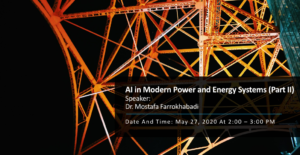Events

In this time of social distancing, we are pleased to announce that all the team members of IEEE YP and WIE Ottawa Sections are fully committed to providing online interaction and support to our community! In partnership with Professional Engineers Ontario, we present an online talk in “Clarifying the Path to Becoming a Professional Engineer.”
If you are an engineering undergraduate or post-graduate student, or a recent graduate starting out your engineering career, then this seminar might be for you. In it you will learn:
- What is PEO?
- What engineering experience is PEO looking for once I graduate?
- I have international engineering education and experience; how is that evaluated by PEO?
- How is my engineering experience evaluated by PEO?
- How do I prepare my Experience Record?
- What is the PPE?
- What is the EIT Program and the Student Membership Program?
The emphasis of this webinar will be on the P. Eng. licensure process – what PEO is looking for. The webinar will focus on how engineering experience is evaluated and how you can facilitate the process. Learn the dos and don’ts of preparing your licensing application for evaluation.
To participate, you will require: internet connection to view the webinar, phone access to dial into the conference for audio.
We look forward to speaking with you!

This seminar discusses the use of AI in modern power and energy systems, in particular electrical distribution networks.
About this Event
Driven by global environmental emission issues and tighter
requirements for system resilience and reliability, electricity
production is shifting from a centralized paradigm to a decentralized
one. In this context, renewable energy sources (RES) and electric
vehicles (EVs) have proliferated over the past decade, exhibiting a
steadily increasing trend. Thus, today, a large number of wind turbines,
photovoltaic (PV) panels, and EVs are connected to medium- (1-69 kV)
and low-voltage (=1 kV) grids, with traditional integrated bulk power
systems becoming decentralized in the presence of active distribution
networks, where the flow of power is bidirectional between generators
and “prosumers”. Such systems are typified by a high penetration of
metering infrastructures, generating a large volume of data, providing
the opportunity to harness the power of big data using data-driven
techniques.
This seminar discusses the use of artificial
intelligence (AI) in modern power and energy systems, in particular
electrical distribution networks. Real-world examples of the use of AI
for energy storage systems optimization and control will be provided and
discussed.
Key Focus
- What are modern power systems control and optimization issues?
- How data-driven techniques can help?
- What is the state-of-the-art?
- What is the path forward?
Admission is FREE! Everyone is welcome! Registration is required!
BIOGRAPHY:
Dr.
Mostafa Farrokhabadi is the Senior Director of Technology at
BluWave-ai. Concurrently, he serves as Associate Editor of IEEE
Transactions on Smart Grid. He has more than 8 years of experience in
designing mission critical grid solutions for industry and academia,
including technical leadership of a $6M international consortium in
electric grid modernization, and smart grids projects with Hatch and
Canadian Solar. Mostafa has (co)authored several articles in high-impact
journals, conference proceedings, and magazines, and holds patents on
intelligent control and optimization of renewable-penetrated grids.
Mostafa has also led the award-winning IEEE Power and Energy Society
Task Force on microgrid stability, an international coalition of 21
researchers from 14 institutions investigating stability issues in
microgrids. Mostafa obtained his PhD in Electrical and Computer
Engineering from the University of Waterloo. He has also studied and
performed research in Sweden at KTH and Germany at KIT. During the
course of his career, Mostafa has received multiple business, research,
and teaching awards, including the prestigious University of Waterloo
Doctoral Thesis Completion Award and Ottawa’s Forty Under 40.

The virtual series of IEEE Women in Engineering International Leadership Conference (WIE ILC) 2020.
The IEEE WIE ILC Virtual Series will take place throughout June 2020,
offering 1-hour sessions, live panel discussions, virtual networking
opportunities, and an on-demand library for you to browse when it’s
convenient for you. Registration is free!
Visit http://ieee-wie-ilc.org/virtual2020/ for more information.
#IEEEWIE

Presented by the IEEE Ottawa Section MTT-S/AP-S Chapter & Young ProfessionalsÂ
Accelerating 5G Design Innovation Through SimulationÂ
                                  By
Dr. Laila SalmanÂ
                               Ansys Inc.
                     Date: Wednesday, June 10, 2020
                        Time: 2:30 PM – 4:00 PM
                                  Location: Online
           Â
Abstract
5G connectivity is the next technological revolution. This pervasive, ultrafast compute network will connect billions of devices with data on-demand. It will drive economic expansion in many sectors, spawn new products and services, and transform our lives as we know it. Yet, before 5G can deliver on its promises and quality of service (QoS) metrics, wireless systems designers and engineers must overcome sizable challenges. Â
Ansys 5G simulation solutions empower these individuals to solve the complexities impeding device, network and data center design. Ansys 5G simulation solutions provide electromagnetics, semiconductor, electronics cooling and mechanical analysis tools to accurately simulate 5G radio and related technologies. The multi-solution platform leverages high-performance computing that can be deployed across the enterprise, allowing designers and engineering experts to collaborate more effectively.Â
This seminar will highlight the following 5G engineering challenges:Â
·  End User Equipment Â
  o  multi-frequency band antenna integrationÂ
  o   modeling of mm-wave array antennas Â
  o   RFI, EMI & Desense MitigationÂ
·  Base-Station Antenna ModelingÂ
  o  Full Communication Analysis in Electrically Large & Complex EnvironmentÂ
  o  RFI, Data Coverage & ElectroThermal ReliabilityÂ
Speaker Bio
Dr. Laila Salman received the B.S. and M.S. degrees in electronics and communication engineering from Cairo University, Egypt, and the PhD. Degree in electromagnetic and antenna design from the University of Mississippi. She also worked as a post-doctoral student at the Université de Quebec en Outaouais, Gatineau, Canada till 2010. Her research was on dielectric resonator antennas, wearable antennas, microwave and millimeter-wave circuits and systems, microwave imaging for early detection of breast cancer and scattering from left-handed metamaterials. Dr. Salman joined Ansys Canada Ltd. in August 2010 as a Lead Technical Services Specialist for High Frequency Applications.
Registration: Please use the link in the registration section to sign up for the event.
To join event use the following link.

Registration is required. A link to the event will be sent to those registered closer to the event date.
Register here: https://www.eventbrite.ca/e/resource-management-for-massive-connectivity-in-future-wireless-networks-tickets-111059596242
About this Event
Future wireless networks (beyond 5G/sixth-generation (6G) networks)
are envisioned to support 3D communication by integrating terrestrial
and aerial networks. The objective is to provide connectivity to a large
number of devices (known as massive connectivity), to support
substantial traffic demands, and expand coverage. However, effective
resource management in future wireless networks is a challenge because
of massive resource-constrained devices, diverse quality-of-service
(QoS) requirements, and a high density of heterogeneous devices. In this
seminar, I will present my recent research progress which is focused on
communication networking aspects of the Internet of Things (IoT), with
emphasis on algorithm design, network architecture development, and
system-level performance analysis. I will provide a brief discussion on
my three most significant contributions which focuses on the design of
novel algorithms and communication protocols for IoT networks, that have
both (i) enhanced network performance, in terms of spectrum efficiency,
coverage, and energy efficiency, and (ii) satisfied a wide range of IoT
devices’ requirements and constraints. I will then share long-term goal
of my research program which is to develop efficient and low complexity
resource management schemes to tackle the challenges of seamless
connectivity of heterogeneous devices anytime and anywhere. Finally, I
will present my short-term objectives in the next five years which are
to develop resource management schemes for massive connectivity in
future terrestrial networks, aerial networks, and self-sustainable
networks (SSNs) while considering different objectives and constraints,
including network scalability, reliability, latency, efficiency
(spectral usage and energy consumption), and complexity.
BIOGRAPHY
Waleed
Ejaz (S’12-M’14-SM’16) is an Assistant Professor in the Department of
Applied Science & Engineering at Thompson Rivers University,
Kamloops, BC, Canada. He is also the founding director of Next
Generation Wireless Networks (NEWNET) research laboratory. Previously,
he held academic and research positions at Ryerson University, Carleton
University, and Queen’s University in Canada. He received the B.Sc. and
M.Sc. degrees in Computer Engineering from the University of Engineering
and Technology, Taxila, Pakistan and the National University of
Sciences and Technology, Islamabad, Pakistan, and the Ph.D. degree in
Information and Communication Engineering from Sejong University,
Republic of Korea, in 2014. He has co-authored over 90 papers in
prestigious journals and conferences, and 3 books. His current research
interests include Internet of Things (IoT), energy harvesting, 5G and
beyond networks, and mobile edge computing. He is an Associate Editor of
the IEEE Communications Magazine, IEEE Canadian Journal of Electrical
and Computer Engineering, and the IEEE ACCESS. Dr. Ejaz completed
certificate courses on “Teaching and Learning in Higher Education†from
the Chang School at Ryerson University. He is a registered Professional
Engineer (P.Eng.) in the province of British Columbia, Canada. Dr. Ejaz
is a senior member of IEEE, member of ACM, and ACM distinguished
speaker.
#IEEEWIEOttawa

